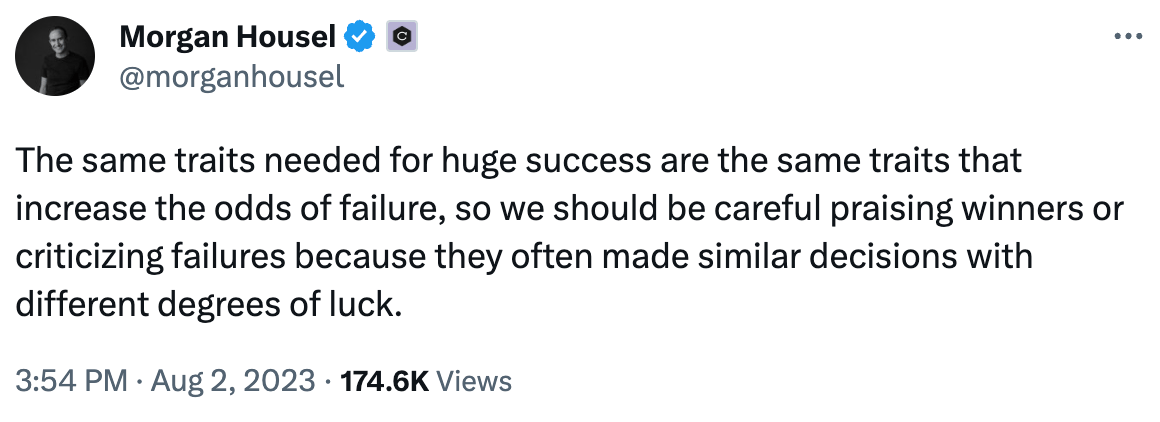On Saturday I shared a deep dive on what top 1% startup employees want with members. Join the community to get access to my library of 45+ deep dives, and a new one in your inbox each Saturday.
Btw — are you fundraising? I’m launching fundraising support for subscribers. Each month I’ll send a curated selection of deals to hundreds of investors in my personal network.
There are a limited number of spots each month, and priority is given to community members. Get a free trial here.
Today at a glance:
Opportunity → Personal AI-Enabled CRM
Framework → RACI Framework
Tool → Guidde
Trend → Micro Weddings
Quote → Success & Failure in Startups

💡 Opportunity: Personal AI-Enabled CRM
Ah, the personal CRM problem. It seems natural that a great product would exist to make keeping track of your personal network easy, right?
Many have tried but so far no one has cracked it. They best two I’ve seen are Clay and Dex, but both sacrifice a little bit of the flexibility you get from Airtable or Google Sheets in exchange for functionality. Ultimately neither has broken out into a massive success.
However this post on X got me thinking:
One of the biggest problems with existing personal CRM solutions is that they take a while to initially set up. Not a lot of people make it over that hump.
LLMs seem well suited to take on a lot of those initial tasks once you log into various services, maybe just asking you occasional questions via chat to help make decisions.
The form factor would also be unique — you wouldn’t need to interact with an AI-based personal CRM through a CRM-esque interface primarily, if you didn’t want to. Or, at a minimum, it could provide data from the CRM in alternate places (where you actually need it), and on-demand.
I talked earlier this year about how one of the few defensible moats for software companies built on LLMs is a unique dataset. At scale this would have the potential to create that.
BTW — want me to send you 2 more detailed startup ideas each week about an emerging trend, with analysis by industry experts? Sign up here for free.
🧠 Framework: RACI Framework
The RACI framework helps founders clarify who is responsible for what parts of a project, and the roles each person plays. When filling it out, you classify each person by whether they are one of the following for each part of the project:
Responsible → Who does the work to complete the task
Accountable → Who provides final review on a task before it’s completed
Consulted → Who provides input on a deliverable based on the impact on their work or expertise
Informed → Who needs to be kept in the loop on projects progress

🛠 Tool: Guidde
Tired of explaining the same thing over and over again to your colleagues? It’s time to delegate that work to AI. Guidde is a GPT-powered tool that helps you explain the most complex tasks in seconds with AI generated documentation.
Simply click capture on our browser extension and the app will automatically generate step-by-step video guides complete with visuals, voiceover and call to actions.
The best part? Their extension is 100% free. Try it here.*
📈 Trend: Micro Weddings
Anyway, this week’s trend is micro weddings. Rather than a big ceremony, they’re intimate gathering typically with just immediate family members. I actually had one myself.

They originally spiked during the pandemic to reduce transmission of COVID, but they’re interestingly hung around as a trend even as the world has opened back up.
Common reasons for having one now include just a desire for a more intimate gathering and, of course, cost. It’s almost as if COVID broke the stigma that you need a huge wedding, and people have leaned into that as the economy has become more challenging.
The wedding industry is massive — $70 billion per year — and the average wedding costs $30k in the US, so there’s room to explore here.
What’s unique here is that micro weddings open up an entire new set of venues, vendor packages, and require a lot less co-ordination. We’ll see if it becomes a venture-scale market.
💬 Quote: Success & Failure in Startups
One of the best parts about the startup world is that it isn’t frowned upon to fail. In fact failure is just treated as something that increases your chances of future success.
Startups fail for any number of reasons, and even successful ones can reach that point due to luck.
Morgan’s point, below, is to be careful with both the hero-worship of winners and mocking failure.
🔗 Houck’s Picks
Why now is a great time to start a company but a tough time to be running one (Link)
Free course on how to buy, grow, and sell companies (Link)
A step-by-step strategy to use influencer marketing to grow your startups (Link)
How to save money on taxes when you sell your startup (Link)
Interesting take on why crowdfunding may not work (Link)
Upgrade for additional picks this week:
Eight ways to reach product-market-fit
Lenny Rachitsky shares good and great conversion rate benchmarks
Seven business lessons about entrepreneurship from Jeff Bezos

💡 How I Can Help
❤️ Upgrade to get all my weekly deep dives and founder community access
💰 Fundraising? I’m sending monthly emails to hundreds of investors in my personal network highlighting exciting deals
💼 Hiring? I partnered with top creators to launch a boutique recruiting service
🤝 Grab time with me for a 1:1 session or a full-day sprint
🚀 Advertise in my newsletter to get in front of 50,000+ founders

“*” indicates sponsored content.



